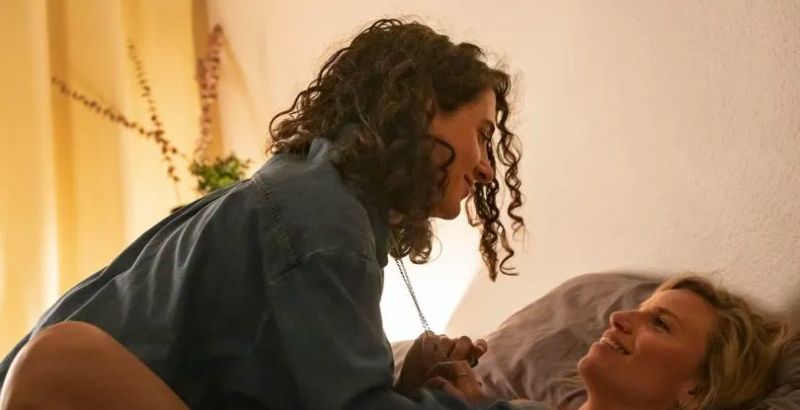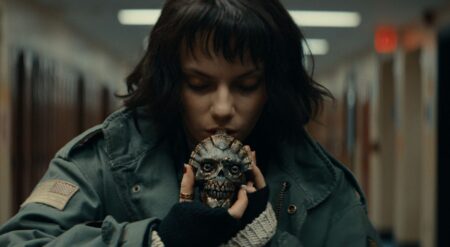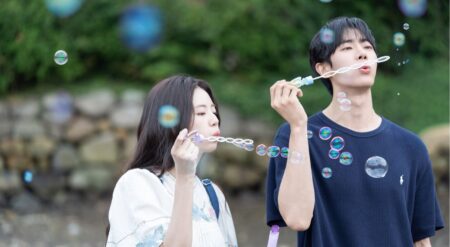
Attachment is a Shudder Original film by Gabriel Bier Gislason that screened as part of Outfest LA Film Festival 2022 about a chance meeting between Maja (Josephine Park) and Leah (Ellie Kendrick) and the romance and horror that ensues. They quickly fall in love and move in together, first in Maja’s native Denmark, then back in England where Leah hails from an Ultra-Orthodox Jewish community and shares a home with her mother (with separate flats, of course).
I’m a total horror wimp, so I’m grateful that this movie is about a lot more than just a demonic possession. Don’t get me wrong, it’s definitely a horror movie and uses its horror moments to good effect. But it really only has a few brief scenes of outright horror and an overtone of creep and menace. It’s rather light on the scare factor, which I both appreciate personally and see as an advantage for the film’s ability to reach perhaps a different audience who isn’t typically into being frightened.
Attachment is about exactly as the name of the film describes: attachment. And that attachment takes three forms. It’s in the form of the relationship between Leah and her mother Chana (Sofie Gråbøl), the rapidly evolving relationship between Leah and Maja, and a dybbuk (a Jewish demon of sorts) that’s possessed Leah. Jewish movies are far from strangers to exploring the unhealthy relationships between mothers and children; it’s a somewhat tired trope, though certainly grounded in the reality of demonstrating the two-way street of attachment that develops when a mother is constantly overprotective and overbearing. The attachment that forms instantaneously between Leah and Maja is just as tropey, but just as grounded too as it relies on the loneliness that comes with being queer without a queer community. And then there’s the dybbuk’s attachment to Leah. While the dybbuk is a vehicle for telling the story, it’s really not that deep and honestly, rarely the focus.
Because let’s be real. There are far scarier things in Jewish parlance than a demon. Our religion doesn’t have a rich canon of occult or monsters, for several reasons. Sure, the Witch of Endor or the concept of a dybbuk are out there, but they’re not exactly integral parts of our theology or even our cultural existence. It’s honestly easier and more astute to induce anxiety and dread within a Jewish audience, in my opinion, by invoking our myriad shared generational trauma rather than by making up a story about a Jewish demon. I don’t think this movie is designed with a Jewish audience in mind, it’s invented mythology frankly feels rather Christian and doesn’t quite lean all the way into the ways the attachments of its Jewish mother and a queer relationship could induce horror on their own. But there’s a reason we don’t see too many Jewish-themed horror movies. When magic and the inexplicable come up in typical Jewish contexts, it’s rare, it’s not conclusive, and it’s far from a focal point.
There is no set or popular understanding of exactly what a dybbuk even is or how it works. Filmmakers have to make that up for themselves or draw from tidbits their grandparents’ grandparents probably made up themselves. There are no codified means of exorcising a demon from somebody or protecting a household from one, and if there are, they’re far from widely known and surely disputed. And without a common understanding, it’s hard to evoke the kind of culturally-rooted fear it seems Attachment is aiming to. Commonality is found in the way we live in insular communities because we have to rely on each other to survive as a people. It’s found in a constant fear of violent antisemitism as it has haunted us for thousands of years and rises now around the world. And it’s found in the anxiety that a Jewish mother can render with the blink of her eyes when she disapproves of your decisions but simply will not tell you why.
This is where Attachment gets itself back on track. The relationship between Leah and Chana is quite well-trodded ground, with the judgment her mother constantly passes and the agita she exhibits about every little thing. But there’s something about the way that it’s all for a true purpose and not only because of generational anxiety that makes the dynamic feel fresher, ultimately. The same is true of Leah’s relationship with Maja. Sure, a U-hauling gone bad feels kind of trite, and there’s a bit of metaphor here about the dangers of rushing into things too quickly that I don’t love, but it doesn’t actually go bad for any classic reasons. Even Leah’s mother and her Ultra-Orthodox uncle Lev (David Dencik) could not care less about Leah being in a relationship with another woman, even under the rushed circumstances.
Like the attachment Chana and Leah have with one another, Leah and Maja’s attachment is depicted as wholly positive. It’s refreshing and actually had me quite interested in watching a non-horror version of this same scenario between Leah, Maja, and Chana. It’s not that the horror elements drag it down or anything, they just feel secondary much of the time to the exploration of those two relationships. Seeing more of those dynamics as they evolved intrigues me, especially given some of the sharp scenes that Maja and Chana share together.
Chana is originally from Denmark herself, so the two converse in Danish a lot, breaking down the barrier that might otherwise exist between them. In fact, the welcomeness that Chana and Lev ultimately show to the very not-Jewish Maja is pretty remarkable. It never made me feel like the reason bad things were happening to Leah was because she was dating a woman or because she was dating a non-Jew. It’s probably not exactly how that would go in real life, so seeing it on screen feels rather nice. It depicts this Jewish community more positively than most representations of traditionally observant Jewish communities get portrayed.
Attachment is a bit messy as it struggles to know exactly what kind of movie it wants to be, with lore built on shaky ground and horror often as an afterthought. It burns slower than a Shabbos candle, but it does get there in the end, using our expectations of both Jewish mothers and lesbian U-Hauling tropes against us when things turn out quite differently. It’s those aspects that help forge a thoughtful movie in the end, even if its primary horror vehicle doesn’t feel quite naturally rooted in Jewishness and often takes a backseat to the relationships I wish we got even more of.
Attachment screened as part of Outfest LA Film Festival 2022 and is streaming soon on Shudder.
Attachment
-
Rating - 7.5/107.5/10
TL;DR
Attachment is a bit messy as it struggles to know exactly what kind of movie it wants to be, with lore built on shaky ground and horror often as an afterthought. It burns slower than a Shabbos candle, but it does get there in the end, using our expectations of both Jewish mothers and lesbian U-Hauling tropes against us when things turn out quite differently. It’s those aspects that help forge a thoughtful movie in the end, even if its primary horror vehicle doesn’t feel quite naturally rooted in Jewishness and often takes a backseat to the relationships I wish we got even more of.






